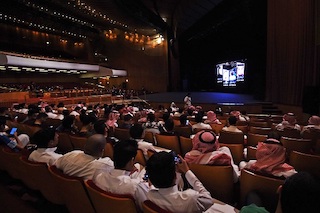The Saudi Film Commission has recently organized a virtual open panel titled “Saudi Films at the Box Office,” shedding light on the performance of the Saudi box office and the influence of Saudi films on both local and global platforms. Noteworthy discussions revolved around the significant reduction in cinema ticket prices, signaling a remarkable shift as they are no longer the highest in the region, with average prices decreasing by more than 16 percent compared to the previous year, according to a report by Saudi Gazette.
 The panel brought together key figures from the cinema industry in Saudi Arabia, featuring contributions from film specialists and enthusiasts. Emphasizing the strategic importance of the distribution and exhibition sector, the discussions were rooted in the Film Commission’s strategy to stimulate demand for Saudi films in selected local and global markets. The overarching goals include creating awareness of Saudi film content on both local and international scales, supporting distribution platforms for local content, enhancing the investment and regulatory environment in the sector, and fostering cultural appreciation for films, particularly those produced in Saudi Arabia.
The panel brought together key figures from the cinema industry in Saudi Arabia, featuring contributions from film specialists and enthusiasts. Emphasizing the strategic importance of the distribution and exhibition sector, the discussions were rooted in the Film Commission’s strategy to stimulate demand for Saudi films in selected local and global markets. The overarching goals include creating awareness of Saudi film content on both local and international scales, supporting distribution platforms for local content, enhancing the investment and regulatory environment in the sector, and fostering cultural appreciation for films, particularly those produced in Saudi Arabia.
Crucial topics addressed encompassed the rapid growth of Saudi cinema since the reopening of cinemas five years ago, boasting 627 screens across 69 venues nationwide – a growth rate among the fastest globally. Notably, box office sales exceeded SAR900m ($239.96 million) annually in 2022 and 2023, with more than 17 million cinema tickets sold in 2023.
The panel delved into the success stories of Saudi films at the box office, spotlighting productions such as Sattar, The Book of Sun, and Night Courier. Filmmakers shared insights into their journeys in the Saudi box office and discussed the nuances between showcasing films on the big screen versus digital platforms.
There was a unanimous acknowledgement of the international competitiveness of Saudi cinema, anticipating keen interest from those exploring the Saudi film industry due to its significant production and operational capabilities.
Participants explored opportunities for Saudi films on local and global cinema screens, including festival screenings, distribution channels, and showcasing on digital platforms. The discussions underscored the importance of applying the best marketing and distribution practices to ensure the success of Saudi films.
Addressing challenges facing the local cinema sector, the panel discussed solutions such as fostering collaboration between the government and private sectors to nurture Saudi talent, enhancing the film industry’s infrastructure in the Kingdom, and encouraging cinema enthusiasts to experience films in theatres rather than solely on digital platforms.
Key elements for the success of Saudi films were identified, including well-planned marketing strategies, story maturity, production quality, and a critical yet constructive view of the evolving Saudi cinematic scene – promising a globally competitive future.
